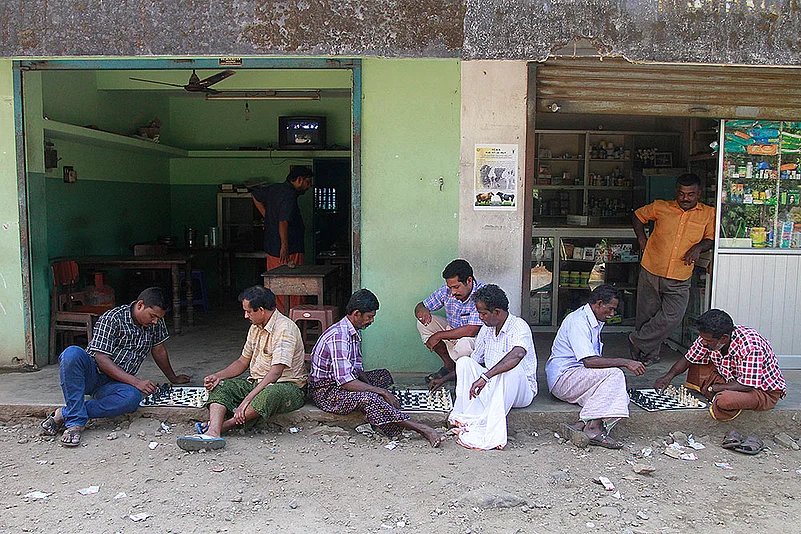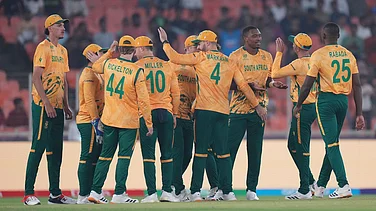- The Beginning: The chess craze began to take hold of the villagers of Marottichal during the early 1970s.
- The Pioneer: C. Unnikrishnan, 60, who runs a roadside teashop, was the first man in the village to pursue chess as a passion.
- The Future: The majority of schoolgoing children in the village play the game and are trained by members of the local chess club.
***
It could be said that chess arrived in the village of Marottichal, in Thrissur district of Kerala, when Unnimammen was just a teenager. That was around 1972, the year when irreverent genius Bobby Fischer met his opponent Boris Spassky in the famed battle in icy Reykjavik. That’s when chess established itself here, half a planet away.
Or it could be argued that the ancient forebear of chess, chaturanga, enjoyed even today in some of the neighbouring villages, was always in the villagers’ veins, waiting for a revival. No wonder the gentle people of Marottichal took as easily to the black-and-white chequered board as Malayali men take to toddy. And since then chess has flourished in Marottichal. There is a player in every household, making this the village with the highest number of ‘chess literates’ in the country. And the village set an Asian record for the highest number of people playing chess at a time when 1,500 villagers, including children, matched their wits seated along a one-and-a-half-kilometre stretch of a road.
Right at the tranquil village square of Marottichal, where the bus makes the final halt before making its noisy U-turn back to Thrissur, is the iconic Unnimammen’s teashop. Yes, the very shop where chess took its first unfaltering step and where villagers continue to stream in to eat, chat and play a game of chess.
The reticent C. Unnikrishnan, 60, popularly known as Unnimammen, reminisces about the time, just after school, when he would travel 15 km to learn chess and come back to play with the only other person who knew the game in the village. Every day the young Unni would carefully read about the classic moves of Fischer and his strange antics while taking on Spassky. Those days, he lets on tersely, the village square was not such a tranquil place. It was a den for drunks.
As the sun came down, the peace would be shattered by boisterous drunken men who would be lying on the ground or brandishing their knives all ready for a brawl. Almost every house in the village was brewing arrack and there seemed to be no way of stopping the liquor menace other than helping the excise men raid the illicit breweries. Oddly, that is what led to the chess craze in Marottichal.

Early Birds Children participate in the Asian record-breaking event, where 1,500 villagers played chess all at once
Recalling those excise raids during the 1970s and ’80s, Unnimammen says, “The excise inspectors would always come late at night and it was mostly while waiting for them that we played chess. Soon, it became an obsession and the games would start right after 4 am when my wife Savithri and I used to open the teashop.”
Savithri, 53, recalls the time she came to the village as a young bride and found her husband already smitten by the chess pieces. Anyone with time to spare would play the game. Any time of day or night would do. Rubber-tappers, whose work started at 4 am, would come back at 11 am for a leisurely game. Many more would come in during the lunch break. People would be sitting right outside on the steps of the shop playing the game.
Later, as the numbers increased, the chess sets were moved to the porch. The Friends Arts and Sports Club in the village library was another place where chess players got together.
Through the 1990s, more and more people in the village quit drinking and took to playing chess. Alcohol was almost completely rooked, so to say. A.M. Jayan, 50, says chess gave him a new lease of life. In 2001, Jayan met with an accident and became paralysed on one side. Rendered unfit for any job, he was sinking into depression when Unnimammen started taking him every day to his teashop and make him sit watching a chess game in progress. “It was after six months of watching others play that I played my first game,” says Jayan. “And by the end of the year, I was confident enough to move around. If it was not for chess, believe me, I would have sunk into depression and would still be lying in bed.”
The village had a tryst with stardom, too. Marottichal is like a character in the 2013 Malayalam film August Club directed by K.B. Venu and many of the villagers were roped in to act in the film. The plot of August Club revolves around a love triangle set in the village chess club. The club’s ruling chess queen, Savithri (played by Rima Kallingal), is a married woman and something brews between her and her rival in chess, a young man named Sirish. Sexual tension fills the frames as Savithri engages in a mental game with Sirish while her husband is away on tour.

Big Moment The record certificate. (Photograph by Sivaram V.)
While researching for his film based on the short story Venalinte Kaalaneekkangal by Anantha Padmanabhan, Venu felt that the storyline was too elitist and was worried the film would be also be seen like that. “I wanted to bring in ordinary people into the film and that is when Padmanabhan, a journalist, remembered reading about the chess village called Marottichal and we decided to make a trip there,” recalls the filmmaker. “When we reached the village, it was evening and we saw people sitting all around playing chess. It was an amazing sight and I knew immediately that the village must be a character in my film.”
Today, there are over 1,000 members in the Marottichal Chess Association and they have started teaching chess to the children in the two schools in the village. “The game has a calming effect on the children, too,” says Vanaja Kumari, teacher at the upper primary school in Marottichal. “During the first year, most of the learning would happen at school, but now they are given all kinds of help to play the game at home too. At least 300 of the 571 children on our rolls play the game. You can see how it has improved discipline and concentration among them.”
Saji Thannikal, secretary of the chess association, pegs the numbers of chess literates in the village at around 2,500, which is nearly half the population. “We are also closely associated with the Thrissur Chess Association and T.R. Anilkumar, who represented India at the World Chess Olympiad and helped us set the Asian record,” says Thannikal. “We have our eyes on the Guinness Book of Records too.”
Anilkumar says Marottichal’s story is about how one man’s passion for chess changed an entire village. “Unnimammen pursued his passion and that changed the scene there,” he says. Yet, ironically, despite the number of chess literates it has, Marottichal has not produced a single district- or state-level champion so far. At present, clearly, the game is more for leisure than sportly ambition. But who knows when the pawn will be queened?
By Minu Ittyipe in Marottichal


























